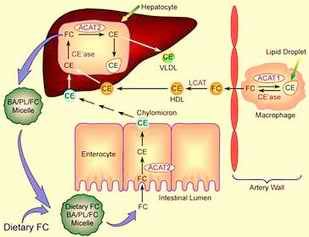 ACAT2 is acyl-coenzyme A: cholesterol acyltransferase 2. It is an enzyme found both in the liver and in the intestine. It is responsible for the synthesis of cholesteryl esters (your LDLs and HDLs) from cholestetol and (long chain) fatty acids either from our diets or internally, from the body.
ACAT2 is acyl-coenzyme A: cholesterol acyltransferase 2. It is an enzyme found both in the liver and in the intestine. It is responsible for the synthesis of cholesteryl esters (your LDLs and HDLs) from cholestetol and (long chain) fatty acids either from our diets or internally, from the body.Doctors always tell you that it is always better to have increased blood plasma concentrations of low density lipoproteins (LDL) and decreased concentrations of high density lipoproteins (HDL) if we want to prevent the development of coronary heart disease (CHD), and of course, coronary artery atherosclerosis (CAA).
Well, there is promising news in this field. A Wake Forest researcher is doing studies on inhibiting the actions of ACAT2, and thereby hope to prevent CHD.
I think it makes sense. This study is very promising. It has a sound scientific basis. The results Dr Rudel presented ahows he knows what he's taking about. Coming up with a medicine that inhibits the action of ACAT2 may indeed one day help prevent CHD dramatically. Clinics and hospitals one day may screen for ACAT2 levels in patients to see who needs the medicine most.Liver Enzyme May Be at Root of Heart Disease
SATURDAY, April 30 (HealthDay News) -- A single enzyme produced by the liver may be guilty of cholesterol accumulation, hardening of the arteries, and death by heart attack.
According to researcher Lawrence Rudel, ACAT2 actively tweaks the structure of both dietary and liver-produced cholesterol, enabling it to move about the bloodstream much more easily. The molecularly altered cholesterol then takes up residence in blood vessel walls, clogging arteries and leading to cardiovascular disease.
He reported that in one set of studies, mice that were genetically engineered to not produce any ACAT2 had 85 percent less hardening of the arteries than mice that produced normal amounts of ACAT2.
[Forbes, Health News]
Although Dr Rudel's preliminary results were done using laboratory rats, his website shows that he has begun reproducing his results using primate monkeys as subjects.
Dr Rudel's works shows great promise and potential.
2 reactions:
Screening for ACAT2 levels only puts more money in the insurance agency's pocket. They will charge higher premiums to these people. Scrap that project.
ACAT2 inhibitor perhaps?
Curiously, does the lower ACAT2 levels show a markedly decreased incidence of atherosclerosis more so than a higher cholesteryl linoleate (from high polyunsaturated oils)? In essence, a dietary change vs. pharmacological intervention--theoretical ideas sometimes get lost in practicality and further misplaced in industry's greed. But get the food industry to switch to polyunsat oils and you can start a renaissance in health. But FDA approval for Rx is easier and more lucrative, n'est pas? Alas the only vision that inspires is the one of dollar signs. Perhaps you can change that.
Well, there's something to chew on.
Let us know how this important research turns out!
Post a Comment